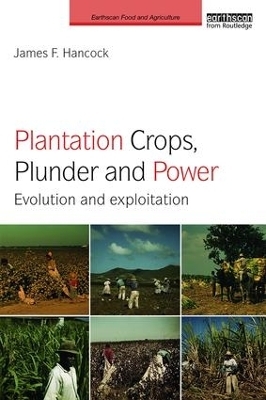
Plantation Crops, Plunder and Power
Evolution and exploitation
Seiten
2017
Routledge (Verlag)
978-1-138-28576-7 (ISBN)
Routledge (Verlag)
978-1-138-28576-7 (ISBN)
This book traces the social, political and evolutionary history of seven major plantation crops – banana, cotton, coffee, rubber, sugarcane, tea and tobacco.
Over the last five centuries, plantation crops have represented the best and worst of industrialized agriculture – "best" through their agronomic productivity and global commercial success, and "worst" as examples of exploitative colonialism, conflict and ill-treatment of workers. This book traces the social, political and evolutionary history of seven major plantation crops – sugarcane, banana, cotton, tea, tobacco, coffee and rubber.
It describes how all of these were domesticated in antiquity and grown by small landowners for thousands of years before European traders and colonists sought to make a profit out of them. The author relates how their development and spread were closely associated with government expansionist policies. They stimulated the exploration of far off lands, were the focus of major conflicts and led to the enslavement of both native and displaced peoples.
From the southern United States, Latin America and the Caribbean, to Asia and Africa, plantation crops turned social structures upside down leading to revolution and government change. The economies of whole countries became tied to the profits of these plantations, leading to internal power struggles to control the burgeoning wealth. Open warfare routinely broke out between the more powerful countries and factions for trade dominance. This book shows that from the early 1500s to today, at least one of the plantation crops was always at the center of world politics, and that this still continues today, for example with the development of oil palm plantations in Southeast Asia. Written in an accessible style, it is fascinating supplementary reading for students of agricultural, environmental and colonial history.
Over the last five centuries, plantation crops have represented the best and worst of industrialized agriculture – "best" through their agronomic productivity and global commercial success, and "worst" as examples of exploitative colonialism, conflict and ill-treatment of workers. This book traces the social, political and evolutionary history of seven major plantation crops – sugarcane, banana, cotton, tea, tobacco, coffee and rubber.
It describes how all of these were domesticated in antiquity and grown by small landowners for thousands of years before European traders and colonists sought to make a profit out of them. The author relates how their development and spread were closely associated with government expansionist policies. They stimulated the exploration of far off lands, were the focus of major conflicts and led to the enslavement of both native and displaced peoples.
From the southern United States, Latin America and the Caribbean, to Asia and Africa, plantation crops turned social structures upside down leading to revolution and government change. The economies of whole countries became tied to the profits of these plantations, leading to internal power struggles to control the burgeoning wealth. Open warfare routinely broke out between the more powerful countries and factions for trade dominance. This book shows that from the early 1500s to today, at least one of the plantation crops was always at the center of world politics, and that this still continues today, for example with the development of oil palm plantations in Southeast Asia. Written in an accessible style, it is fascinating supplementary reading for students of agricultural, environmental and colonial history.
James F. Hancock is Professor Emeritus, Department of Horticulture, Michigan State University, USA. He is author of Plant Evolution and the Origin of Crop Species, now in its third edition.
Introduction: the role of plantation crops in world history 1. Sugar 2. Banana 3. Cotton 4. Tea 5. Tobacco 6. Coffee 7. Rubber 8. Plantation crops: yesterday and today
| Erscheinungsdatum | 07.05.2017 |
|---|---|
| Reihe/Serie | Earthscan Food and Agriculture |
| Zusatzinfo | 1 Tables, black and white; 3 Line drawings, black and white; 22 Halftones, black and white; 26 Illustrations, black and white |
| Verlagsort | London |
| Sprache | englisch |
| Maße | 156 x 234 mm |
| Gewicht | 317 g |
| Themenwelt | Geschichte ► Teilgebiete der Geschichte ► Wirtschaftsgeschichte |
| Naturwissenschaften ► Geowissenschaften ► Geografie / Kartografie | |
| Sozialwissenschaften ► Politik / Verwaltung | |
| Technik ► Umwelttechnik / Biotechnologie | |
| Weitere Fachgebiete ► Land- / Forstwirtschaft / Fischerei | |
| ISBN-10 | 1-138-28576-5 / 1138285765 |
| ISBN-13 | 978-1-138-28576-7 / 9781138285767 |
| Zustand | Neuware |
| Haben Sie eine Frage zum Produkt? |
Mehr entdecken
aus dem Bereich
aus dem Bereich


